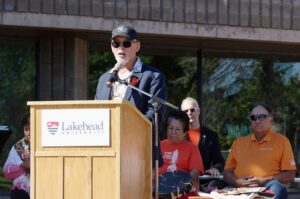Bill 31, Murray Whetung Community Service Award Act 2022 introduced in the Legislative Assembly of Ontario

By Rick Garrick
BIINJITIWAABIK ZAAGING ANISHINAABEK — Anishinabek Nation Northern Superior Regional Deputy Grand Council Chief Melvin Hardy and former Curve Lake Chief Emily Whetung recently joined with Peterborough-Kawartha MPP Dave Smith and Citizenship and Multiculturalism Minister Michael Ford to announce the introduction of Bill 31, Murray Whetung Community Service Award Act 2022.
“What the minister talked about [was] he wanted to acknowledge not just Murray Whetung but also all the [Indigenous] veterans,” Regional Deputy Grand Council Chief Hardy says. “He wanted to be able to give the Murray Whetung Community Service Award to one selected cadet from the Royal Canadian Air Cadet, the Royal Canadian Army Cadet, and the Royal Canadian Sea Cadet to acknowledge their community service but as well to [acknowledge] the plight of our veterans for what they had experienced after they had contributed so vastly in the wars.”
Smith moved the First Reading of the Bill on Nov. 3 in the Legislative Assembly of Ontario, where it was carried.
“The Murray Whetung Community Service Award Act, 2022, provides that the Minister of Citizenship and Multiculturalism shall provide for an award to be given each year to a cadet in each local corps who is selected by their corps for demonstrating exceptional citizenship and volunteerism within their community and their corps,” Smith says.
Regional Deputy Grand Council Chief Hardy says people have had a favourable response to the introduction of the Bill because Indigenous veterans were not fully recognized for their efforts in the two world wars up until 1994 when the first Indigenous Veterans Day was held on Nov. 8.
“We actually did create … a new platform for veterans in the [Anishinabek Nation’s] 39 communities to be able to give them voice, to be able to advocate, to be able to be specific about our veterans and their experiences,” he says. “A lot of people are really appreciative that we are bringing [this] to the centre stage.”
Regional Deputy Grand Council Chief Hardy says Anishinabek Nation veterans recently raised awareness about a proposed condo project close to the D-Day landing site on Juno Beach in France where some Indigenous soldiers had died during battle.
“We started a letter campaign,” he says. “We never heard anything for a while; just last week we received a letter from the Juno Beach Museum thanking myself and the Grand Council Chief Reg Niganobe. It was our letters he said that [got] Canada to stand up and they actually purchased that land. They were just thankful — they couldn’t believe that we were able to pull that together. A lot of our veterans had died on that beach … and that’s one of the reasons we fought that.”
Regional Deputy Grand Council Chief Hardy says he did a lot of training and a lot of travelling during his six years in the Canadian Forces, where he served with an artillery unit that was a branch of a special service force that he is not allowed to share certain details about.
“It was with the Devil’s Brigade,” he says. “The Devil’s Brigade was one of the units that was developed by a combination of Canada and the United States.”
Regional Deputy Grand Council Chief Hardy says the Canadian Forces is a great opportunity for people to learn about their own strengths, noting that his discipline helps him with his leadership role.
“For First Nations today, there’s a lot of on-the-land activities that they’re doing to bring back the culture, so that’s somewhat the same for when I was a young soldier,” he says. “So I think it is a very positive opportunity, and you do become a role model without even knowing it.”
Regional Deputy Grand Council Chief Hardy says he learned how to drive an M109 self-propelled howitzer during his time with the Canadian Forces.
“We also had the L5s, that’s what we jumped with,” he recalls. “I parachuted with the L5s, we used to have to take that howitzer apart.”


